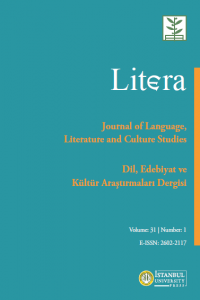Öz
Kaynakça
- Bhabha, H. (1994). The Location of Culture. London: Routledge.
- Bhabha, H. & Stierstorfer, K. (2017). Diaspora and Home: An Interview with Homi K. Bhabha, 7 December. https://blog.degruyter.com/diaspora-and-home-interview-homi-k-bhabha/
- Boscaljon, D. (2016). Introduction. In D. Boscaljon (ed.). Resisting the Place of Belonging (pp.1-8). Oxon: Routledge.
- Derrida, J. (1998). Monolingualism of the Other: or, The Prothesis of Origin. Palo Alto: Stanford University Press.
- Derrida, J. & Dufourmantelle, A. (2000). Of Hospitality. Palo Alto: Stanford University Press.
- Fradley, M. & Riley, J.A. (2019). “Dirty Bearded Men in a Room!”: Twin Peaks, The Return and the Politics of Lynchian Comedy. In A. DiPaolo and J. Gillies (eds.), The Politics of Twin Peaks (pp. 69-94). London: Lexington Books.
- Freud, S. (1955). The Uncanny. In J.Strachey et al (eds.), The Standard Edition of the Complete Psychological Works of Sigmund Freud vol. XVII. London: Hogarth Press and the Institute for Psycho-Analysis.
- Jasper, D. (2016). Knowing for the First Time. In D. Boscaljon (ed.). Resisting the Place of Belonging (pp. 9-20). Oxon: Routledge.
- Kristeva, J. (1991). Strangers to Ourselves. New York: Columbia University Press.
- Kundera, M. (2002). Ignorance. London: Faber and Faber.
- Mateoc, F. (2011). Déracinement et Nostalgie dans L’Ignorance de Milan Kundera. Confluenţe 2010-2011, 47-60
- Pireddu, N. (2015). European Ulyssiads: Claudio Magris, Milan Kundera, Eric-Emmanuel Schmitt. Comparative Literature 67(3), 267-286
- Royle, N. (2003). The Uncanny. Manchester: Manchester University Press.
- Şandru, C. (2012). Worlds Apart? A Postcolonial Reading of post-1945 East-Central European Culture. Cambridge: Cambridge Scholars.
- Vidler, A. (1992). The Architectural Uncanny: Essays in the Modern Unhomely. London: MIT.
- Windsor, M. (2019). What is the Uncanny? The British Journal of Aesthetics 59(1), 51-65
- Yeğenoğlu, M. (2012). Islam, Migrancy and Hospitality in Europe. London: Palgrave Macmillan.
- Yıldız, Y. (2013). Beyond the Mother Tongue: The Postmonolingual Condition. New York: Modern Languages Initiative.
- Ziarek, E. (1995). The Uncanny Style of Kristeva’s Critique of Nationalism, Postmodern Culture 1995(2). https://muse.jhu.edu/article/27517
The Uncanny and the ‘Great Return’ from Exile: Unheimlich (Un)homecomings in Milan Kundera’s Ignorance
Öz
This paper analyses Milan Kundera’s novel Ignorance, which focuses on the return of two emigrés, Irena and Josef, to the Czech republic following the collapse of the Communist regime there. The novel is explored from the perspective of the uncanny, the unheimlich, literally the unhomely. The uncanniness of the experience of migration, for both the migrant and the host society, has been famously explored by critics such as Homi Bhabha and Julia Kristeva. However, arguably, not only the experience of migration but also that of homecoming can be uncanny. In this context, based on work by Boscaljon et al. (2016), this paper focuses on the uncanniness of Irena and Josef ’s return to their country of origin. For Boscaljon et al. homecoming following a long period abroad can be profoundly uncanny, in that the familiarity of home has become, to an extent, unfamiliar after years of absence; both the emigré and their home have changed in the meantime. Moreover, the return home can be uncanny in that the emigré may effectively be confronted with their own eerie doubles in the form of abjected past or alternative selves. In this context, Irena and Jozef find a profoundly changed Prague on their return, and their reencounter with their families and old friends, with their language, and even with their own past selves is arguably one of an uncanny (un)familiarity.
Anahtar Kelimeler
Kaynakça
- Bhabha, H. (1994). The Location of Culture. London: Routledge.
- Bhabha, H. & Stierstorfer, K. (2017). Diaspora and Home: An Interview with Homi K. Bhabha, 7 December. https://blog.degruyter.com/diaspora-and-home-interview-homi-k-bhabha/
- Boscaljon, D. (2016). Introduction. In D. Boscaljon (ed.). Resisting the Place of Belonging (pp.1-8). Oxon: Routledge.
- Derrida, J. (1998). Monolingualism of the Other: or, The Prothesis of Origin. Palo Alto: Stanford University Press.
- Derrida, J. & Dufourmantelle, A. (2000). Of Hospitality. Palo Alto: Stanford University Press.
- Fradley, M. & Riley, J.A. (2019). “Dirty Bearded Men in a Room!”: Twin Peaks, The Return and the Politics of Lynchian Comedy. In A. DiPaolo and J. Gillies (eds.), The Politics of Twin Peaks (pp. 69-94). London: Lexington Books.
- Freud, S. (1955). The Uncanny. In J.Strachey et al (eds.), The Standard Edition of the Complete Psychological Works of Sigmund Freud vol. XVII. London: Hogarth Press and the Institute for Psycho-Analysis.
- Jasper, D. (2016). Knowing for the First Time. In D. Boscaljon (ed.). Resisting the Place of Belonging (pp. 9-20). Oxon: Routledge.
- Kristeva, J. (1991). Strangers to Ourselves. New York: Columbia University Press.
- Kundera, M. (2002). Ignorance. London: Faber and Faber.
- Mateoc, F. (2011). Déracinement et Nostalgie dans L’Ignorance de Milan Kundera. Confluenţe 2010-2011, 47-60
- Pireddu, N. (2015). European Ulyssiads: Claudio Magris, Milan Kundera, Eric-Emmanuel Schmitt. Comparative Literature 67(3), 267-286
- Royle, N. (2003). The Uncanny. Manchester: Manchester University Press.
- Şandru, C. (2012). Worlds Apart? A Postcolonial Reading of post-1945 East-Central European Culture. Cambridge: Cambridge Scholars.
- Vidler, A. (1992). The Architectural Uncanny: Essays in the Modern Unhomely. London: MIT.
- Windsor, M. (2019). What is the Uncanny? The British Journal of Aesthetics 59(1), 51-65
- Yeğenoğlu, M. (2012). Islam, Migrancy and Hospitality in Europe. London: Palgrave Macmillan.
- Yıldız, Y. (2013). Beyond the Mother Tongue: The Postmonolingual Condition. New York: Modern Languages Initiative.
- Ziarek, E. (1995). The Uncanny Style of Kristeva’s Critique of Nationalism, Postmodern Culture 1995(2). https://muse.jhu.edu/article/27517
Ayrıntılar
| Birincil Dil | İngilizce |
|---|---|
| Konular | Sanat ve Edebiyat |
| Bölüm | Araştırma Makaleleri |
| Yazarlar | |
| Yayımlanma Tarihi | 23 Haziran 2021 |
| Gönderilme Tarihi | 7 Aralık 2020 |
| Yayımlandığı Sayı | Yıl 2021 Cilt: 31 Sayı: 1 |

